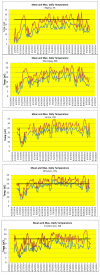Individual and public-program adaptation: coping with heat waves in five cities in Canada
- PMID: 22408596
- PMCID: PMC3290981
- DOI: 10.3390/ijerph8124679
Individual and public-program adaptation: coping with heat waves in five cities in Canada
Abstract
Heat Alert and Response Systems (HARS) are currently undergoing testing and implementation in Canada. These programs seek to reduce the adverse health effects of heat waves on human health by issuing weather forecasts and warnings, informing individuals about possible protections from excessive heat, and providing such protections to vulnerable subpopulations and individuals at risk. For these programs to be designed effectively, it is important to know how individuals perceive the heat, what their experience with heat-related illness is, how they protect themselves from excessive heat, and how they acquire information about such protections. In September 2010, we conducted a survey of households in 5 cities in Canada to study these issues. At the time of the survey, these cities had not implemented heat outreach and response systems. The study results indicate that individuals' recollections of recent heat wave events were generally accurate. About 21% of the sample reported feeling unwell during the most recent heat spell, but these illnesses were generally minor. Only in 25 cases out of 243, these illnesses were confirmed or diagnosed by a health care professional. The rate at which our respondents reported heat-related illnesses was higher among those with cardiovascular and respiratory illnesses, was higher among younger respondents and bore no relationship with the availability of air conditioning at home. Most of the respondents indicated that they would not dismiss themselves as "not at risk" and that they would cope with excessive heat by staying in air conditioned environments and keeping well hydrated. Despite the absence of heat outreach and education programs in their city, our respondents at least a rough idea of how to take care of themselves. The presence of air conditioning and knowledge of cooling centers is location-specific, which provides opportunities for targeting HARS interventions.
Keywords: Heat Alert Response Systems (HARS); Heat/Health Watch/Warning Systems (HHWW); excessive heat; heat-related illness.
Figures



Similar articles
-
Indoor Temperatures in the 2018 Heat Wave in Quebec, Canada: Exploratory Study Using Ecobee Smart Thermostats.JMIR Form Res. 2022 May 12;6(5):e34104. doi: 10.2196/34104. JMIR Form Res. 2022. PMID: 35550317 Free PMC article.
-
Heat waves in South Korea: differences of heat wave characteristics by thermal indices.J Expo Sci Environ Epidemiol. 2019 Oct;29(6):790-805. doi: 10.1038/s41370-018-0076-3. Epub 2018 Oct 3. J Expo Sci Environ Epidemiol. 2019. PMID: 30283069
-
Development and Validation of a Behavioural Index for Adaptation to High Summer Temperatures among Urban Dwellers.Int J Environ Res Public Health. 2017 Jul 21;14(7):820. doi: 10.3390/ijerph14070820. Int J Environ Res Public Health. 2017. PMID: 28754017 Free PMC article.
-
The potential impacts of climate variability and change on temperature-related morbidity and mortality in the United States.Environ Health Perspect. 2001 May;109 Suppl 2(Suppl 2):185-9. doi: 10.1289/ehp.109-1240665. Environ Health Perspect. 2001. PMID: 11359685 Free PMC article. Review.
-
Is There a Need to Integrate Human Thermal Models with Weather Forecasts to Predict Thermal Stress?Int J Environ Res Public Health. 2019 Nov 19;16(22):4586. doi: 10.3390/ijerph16224586. Int J Environ Res Public Health. 2019. PMID: 31752444 Free PMC article. Review.
Cited by
-
An evidence-based public health approach to climate change adaptation.Environ Health Perspect. 2014 Nov;122(11):1177-86. doi: 10.1289/ehp.1307396. Epub 2014 Jul 8. Environ Health Perspect. 2014. PMID: 25003495 Free PMC article. Review.
-
Climate crisis risks to elderly health: strategies for effective promotion and response.Health Promot Int. 2024 Apr 1;39(2):daae031. doi: 10.1093/heapro/daae031. Health Promot Int. 2024. PMID: 38568732 Free PMC article. Review.
-
Risk and Resilience: How Is the Health of Older Adults and Immigrant People Living in Canada Impacted by Climate- and Air Pollution-Related Exposures?Int J Environ Res Public Health. 2021 Oct 9;18(20):10575. doi: 10.3390/ijerph182010575. Int J Environ Res Public Health. 2021. PMID: 34682320 Free PMC article. Review.
-
Towards Improvement of Heatwave Warnings for Older Adults: The Case of Queensland Australia.J Prim Care Community Health. 2024 Jan-Dec;15:21501319241286584. doi: 10.1177/21501319241286584. J Prim Care Community Health. 2024. PMID: 39494991 Free PMC article.
-
Valuation of mortality risk attributable to climate change: investigating the effect of survey administration modes on a VSL.Int J Environ Res Public Health. 2012 Dec 18;9(12):4760-81. doi: 10.3390/ijerph9124760. Int J Environ Res Public Health. 2012. PMID: 23249861 Free PMC article.
References
-
- Intergovernmental Panel on Climate Change (IPCC) IPCC, 2000. Impacts, Adaptation and Vulnerability. The Contribution of Working Group II to the Third Scientific Assessment of the Intergovernmental Panel on Climate Change. Cambridge University Press; Cambridge, UK: 2001.
-
- Intergovernmental Panel on Climate Change (IPCC) Climate Change 2007: Working Group II: Impacts, Adaption and Vulnerability. Cambridge University Press; Cambridge, UK: 2007. [(accessed on 28 March 2010)]. Available online: http://www.ipcc.ch/publications_and_data/ar4/wg2/en/contents.html.
-
-
Heat stroke, or heat illness, is the result of exposure to extreme temperatures and the failure of the body to regulate its temperature. The immediate effects include dizziness, fatigue, and nausea. If untreated, heat illness may result in coma and death. Immediate medical attention is needed to prevent heat stroke to be fatal.
-
-
- Excessive Heat Events Guidebook; EPA 430-B-06-005. US Environmental Protection Agency (US EPA); Washington, DC, USA: 2006.
-
- Semenza J.C., Rubin C.H., Falter K.H., Selanikio J.D., Flanders W.D., Howe H.L., Wilheim J.L. Heat-related deaths during the July 1995 heat wave in Chicago. N. Engl. J. Med. 1996;335:84–90. - PubMed
MeSH terms
LinkOut - more resources
Full Text Sources

